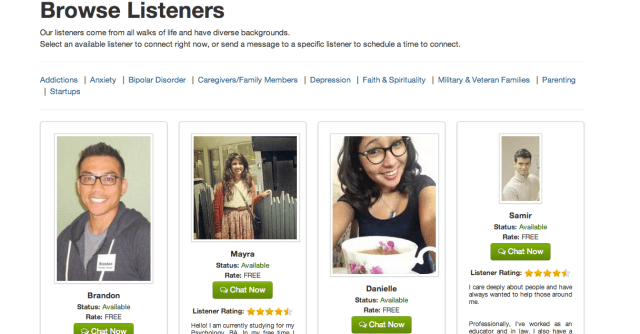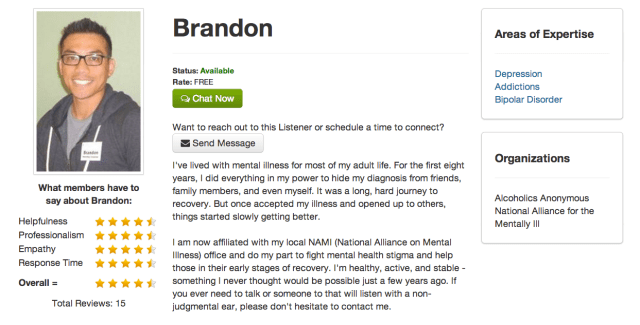It’s almost a cliche to complain about the alienating effects of technology, but the Internet is an amazing resource for combating isolation. Sites and online forums mean people who suffer from stigmatized conditions like depression can find support that was unavailable just a decade ago. Now Y Combinator startup 7 Cups of Tea wants to help connect people in need of emotional support with the site’s trained listeners.
Founded by clinical psychologist Glen Moriarty, 7 Cups of Tea positions itself as an alternative for people who need more immediate support than an online forum but don’t want to see a therapist (though if necessary, listeners will refer callers to mental health professionals). Users can start with text chats and then switch to voice calls when they feel more comfortable, as well as request specific listeners. 7 Cups Of Tea, which is named after a poem by Chinese poet Lu Tong and soft-launched at the end of June, currently has over 100 listeners and gets 1,000 call requests a week.
“The vast majority of people are not struggling with any really significant disorders. They are just going through a hard time. Maybe their kids are overwhelming them or their marriage is not working out right. They might have a lot of questions about things, like ‘is this normal?’ and feel like they can’t talk to anyone about it,” Moriarty says. “They just want to share it with someone.”
Sometimes callers want to connect with listeners who have had similar life experiences. 7 Cups Of Tea recruited many of its current listeners through organizations like the National Alliance On Mental Illness (NAMI), Active Minds, a student group for mental health advocacy, Narcotics Anonymous and the Down Syndrome Association. Other listeners include military spouses, graduate students in psychology and caregivers of people with long-term health issues.
One of Moriarty’s main is to help people who feel isolated find support.
“One person had two sons with Asperger’s Syndrome. He texted five of his friends because he needed someone to talk to and none of them responded. It’s the loneliest feeling,” says Moriarty, himself the father of twins born prematurely. “With our site, I don’t have to worry about burning my friends out. I can’t call my therapist at 11 o’clock at night, but I can just go on and see if there is a listener available.”
Potential listeners must complete an online training program and speak with Moriarty on the phone before they start taking calls.
“I try to assess why they are interested in being a listener and just make sure that they understand the basic concept. If someone is telling you a story, try to understand what it would feel like to be them,” says Moriarty. “I think most people feel relieved when they get that: ‘I’m not alone, I feel validated.'”
7 Cups Of Tea conducts a background check on all listeners to ensure the safety of users. After each session, they are ranked by the caller on helpfulness, professionalism, empathy and response time. If someone is undergoing a crisis that is beyond the scope of 7 Cups of Tea’s listeners, they are referred to hotlines for specific issues or resources to help them find professional therapists.
Safeguards are in place for listeners, too. Calls are connected through a bridging service that allows both people to remain anonymous and listeners can use a nickname on their 7 Cups of Tea profile. Sessions with harassing or rude callers are disconnected immediately. 7 Cups of Tea is aware that helping others cope with problems can take an emotional toll on even the most empathetic person and provides support for the site’s listeners.
7 Cups of Tea’s team is still working on monetization strategies. Listeners can currently elect to charge a fee and if they do, the site takes a commission. Moriarty says the site’s current focus, however, is recruiting listeners to ensure users get their calls answered as soon as possible.
“We just want to be a place where you can get support,” says Moriarty. “Late at night, when you are all alone, the kids are in bed and you are exhausted and just need someone to fill your tank back up, give us a call.”


